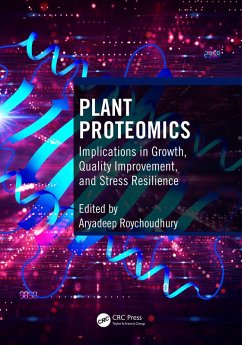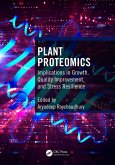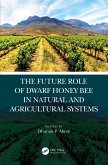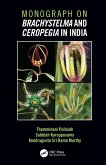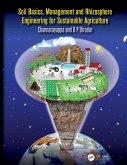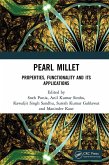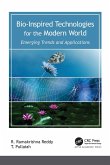Plant Proteomics (eBook, PDF)
Implications in Growth, Quality Improvement, and Stress Resilience
Redaktion: Roychoudhury, Aryadeep
47,95 €
47,95 €
inkl. MwSt.
Sofort per Download lieferbar

24 °P sammeln
47,95 €
Als Download kaufen

47,95 €
inkl. MwSt.
Sofort per Download lieferbar

24 °P sammeln
Jetzt verschenken
Alle Infos zum eBook verschenken
47,95 €
inkl. MwSt.
Sofort per Download lieferbar
Alle Infos zum eBook verschenken

24 °P sammeln
Plant Proteomics (eBook, PDF)
Implications in Growth, Quality Improvement, and Stress Resilience
Redaktion: Roychoudhury, Aryadeep
- Format: PDF
- Merkliste
- Auf die Merkliste
- Bewerten Bewerten
- Teilen
- Produkt teilen
- Produkterinnerung
- Produkterinnerung

Bitte loggen Sie sich zunächst in Ihr Kundenkonto ein oder registrieren Sie sich bei
bücher.de, um das eBook-Abo tolino select nutzen zu können.
Hier können Sie sich einloggen
Hier können Sie sich einloggen
Sie sind bereits eingeloggt. Klicken Sie auf 2. tolino select Abo, um fortzufahren.

Bitte loggen Sie sich zunächst in Ihr Kundenkonto ein oder registrieren Sie sich bei bücher.de, um das eBook-Abo tolino select nutzen zu können.
Plant Proteomics: Implications in Growth, Quality Improvement, and Stress Resilience introduces readers to techniques and methodologies of proteomics and explains different physiological phenomena in plants and their responses to various environmental cues and defense mechanisms against pathogens.
- Geräte: PC
- mit Kopierschutz
- eBook Hilfe
Andere Kunden interessierten sich auch für
![Plant Proteomics (eBook, ePUB) Plant Proteomics (eBook, ePUB)]() Plant Proteomics (eBook, ePUB)47,95 €
Plant Proteomics (eBook, ePUB)47,95 €![The Future Role of Dwarf Honey Bees in Natural and Agricultural Systems (eBook, PDF) The Future Role of Dwarf Honey Bees in Natural and Agricultural Systems (eBook, PDF)]() The Future Role of Dwarf Honey Bees in Natural and Agricultural Systems (eBook, PDF)53,95 €
The Future Role of Dwarf Honey Bees in Natural and Agricultural Systems (eBook, PDF)53,95 €![Monograph on Brachystelma and Ceropegia in India (eBook, PDF) Monograph on Brachystelma and Ceropegia in India (eBook, PDF)]() Thammineni PullaiahMonograph on Brachystelma and Ceropegia in India (eBook, PDF)168,95 €
Thammineni PullaiahMonograph on Brachystelma and Ceropegia in India (eBook, PDF)168,95 €![Soil Basics, Management and Rhizosphere Engineering for Sustainable Agriculture (eBook, PDF) Soil Basics, Management and Rhizosphere Engineering for Sustainable Agriculture (eBook, PDF)]() Channarayappa C.Soil Basics, Management and Rhizosphere Engineering for Sustainable Agriculture (eBook, PDF)231,95 €
Channarayappa C.Soil Basics, Management and Rhizosphere Engineering for Sustainable Agriculture (eBook, PDF)231,95 €![Non-Coding RNAs (eBook, PDF) Non-Coding RNAs (eBook, PDF)]() Non-Coding RNAs (eBook, PDF)51,95 €
Non-Coding RNAs (eBook, PDF)51,95 €![Pearl Millet (eBook, PDF) Pearl Millet (eBook, PDF)]() Pearl Millet (eBook, PDF)54,95 €
Pearl Millet (eBook, PDF)54,95 €![Bio-Inspired Technologies for the Modern World (eBook, PDF) Bio-Inspired Technologies for the Modern World (eBook, PDF)]() R. Ramakrishna ReddyBio-Inspired Technologies for the Modern World (eBook, PDF)155,95 €
R. Ramakrishna ReddyBio-Inspired Technologies for the Modern World (eBook, PDF)155,95 €-
-
-
Plant Proteomics: Implications in Growth, Quality Improvement, and Stress Resilience introduces readers to techniques and methodologies of proteomics and explains different physiological phenomena in plants and their responses to various environmental cues and defense mechanisms against pathogens.
Dieser Download kann aus rechtlichen Gründen nur mit Rechnungsadresse in A, B, BG, CY, CZ, D, DK, EW, E, FIN, F, GR, HR, H, IRL, I, LT, L, LR, M, NL, PL, P, R, S, SLO, SK ausgeliefert werden.
Produktdetails
- Produktdetails
- Verlag: Taylor & Francis eBooks
- Seitenzahl: 308
- Erscheinungstermin: 3. Juni 2024
- Englisch
- ISBN-13: 9781040027448
- Artikelnr.: 70306171
- Verlag: Taylor & Francis eBooks
- Seitenzahl: 308
- Erscheinungstermin: 3. Juni 2024
- Englisch
- ISBN-13: 9781040027448
- Artikelnr.: 70306171
- Herstellerkennzeichnung Die Herstellerinformationen sind derzeit nicht verfügbar.
Prof. Aryadeep Roychoudhury is currently working as Professor in the Discipline of Life Sciences, Indira Gandhi National Open University, New Delhi, India. Earlier, he served as Assistant Professor at the Post Graduate Department of Biotechnology, St. Xavier's College (Autonomous), Kolkata, West Bengal, India. He earned his B.Sc. (Hons.) in Botany from Presidency College, Kolkata, and M.Sc. in Biophysics and Molecular Biology, University of Calcutta, West Bengal, India. He earned his Ph.D. from Jadavpur University, Kolkata in the area of stress biology in plants. Following his Ph.D. work, he joined the University of Calcutta as Research Associate (post-doctorate), pursuing translational research on transgenic rice. He is presently involved in active research in the field of abiotic stress responses in plants with perspectives to the physiology, molecular biology and cell signaling under diverse stress conditions. He has 23 years of research experience in the concerned discipline. Prof. Roychoudhury has handled several government-funded projects as principal investigator and supervised five Ph.D. students as principal investigator. He has published over 250 articles in peer-reviewed journals and chapters in books of international and national repute. He has edited many books with Wiley, Elsevier, Springer, Taylor & Francis Group, and Nova, and has also handled Special Issues as Guest Editor for several renowned international journals. He is a regular reviewer of articles in high-impact, international journals, Life Member of different scientific associations and societies, and the recipient of the Young Scientist Award 2019, conferred upon him by International Foundation for Environment and Ecology, at University of Allahabad, Prayagraj, Uttar Pradesh. His name is included in the Stanford University's List of World's Top 2% Influential Scientists.
Chapter 1: Plant proteome analyses in response to seed development. Chapter
2: Advances in plant proteomics toward improvement of crop productivity and
stress resistance. Chapter 3: Proteomics research in understanding
photosynthesis-related proteins in plants. Chapter 4: Proteomic analyses to
understand differentially expressed proteins during floral development.
Chapter 5: Proteomic responses to salinity and drought stress in plants.
Chapter 6: Proteomics studies to understand heavy metal stress response in
plants. Chapter 7: Proteomic Responses of Plants to Nutritional Stress.
Chapter 8: Effect of ionizing radiation on physiological activities of crop
plants exposed to various abiotic stresses and their proteome analysis.
Chapter 9: Phosphoproteomic study of plants under different abiotic stress.
Chapter 10: Advancement in proteomics research in response to biotic stress
in plants. Chapter 11: Proteomic-driven approaches for unravelling
plant-microbe interactions. Chapter 12: Deciphering Plant-microbe Crosstalk
Through Protemics Tools. Chapter 13: Dissecting Plant Virus Interactions
Through Proteomics. Chapter 14: Plant proteomics research for enhancing
resistance against insect pests. Chapter 15: Proteomics Approaches in
Medicinal Plant Research and Pharmacological Studies. Chapter 16:
Proteomics-based strategies to develop food crops. Chapter 17: with
enhanced nutritional quality. Chapter 18: Understanding post translational
protein modification through proteomics tools.
2: Advances in plant proteomics toward improvement of crop productivity and
stress resistance. Chapter 3: Proteomics research in understanding
photosynthesis-related proteins in plants. Chapter 4: Proteomic analyses to
understand differentially expressed proteins during floral development.
Chapter 5: Proteomic responses to salinity and drought stress in plants.
Chapter 6: Proteomics studies to understand heavy metal stress response in
plants. Chapter 7: Proteomic Responses of Plants to Nutritional Stress.
Chapter 8: Effect of ionizing radiation on physiological activities of crop
plants exposed to various abiotic stresses and their proteome analysis.
Chapter 9: Phosphoproteomic study of plants under different abiotic stress.
Chapter 10: Advancement in proteomics research in response to biotic stress
in plants. Chapter 11: Proteomic-driven approaches for unravelling
plant-microbe interactions. Chapter 12: Deciphering Plant-microbe Crosstalk
Through Protemics Tools. Chapter 13: Dissecting Plant Virus Interactions
Through Proteomics. Chapter 14: Plant proteomics research for enhancing
resistance against insect pests. Chapter 15: Proteomics Approaches in
Medicinal Plant Research and Pharmacological Studies. Chapter 16:
Proteomics-based strategies to develop food crops. Chapter 17: with
enhanced nutritional quality. Chapter 18: Understanding post translational
protein modification through proteomics tools.
Chapter 1: Plant proteome analyses in response to seed development. Chapter
2: Advances in plant proteomics toward improvement of crop productivity and
stress resistance. Chapter 3: Proteomics research in understanding
photosynthesis-related proteins in plants. Chapter 4: Proteomic analyses to
understand differentially expressed proteins during floral development.
Chapter 5: Proteomic responses to salinity and drought stress in plants.
Chapter 6: Proteomics studies to understand heavy metal stress response in
plants. Chapter 7: Proteomic Responses of Plants to Nutritional Stress.
Chapter 8: Effect of ionizing radiation on physiological activities of crop
plants exposed to various abiotic stresses and their proteome analysis.
Chapter 9: Phosphoproteomic study of plants under different abiotic stress.
Chapter 10: Advancement in proteomics research in response to biotic stress
in plants. Chapter 11: Proteomic-driven approaches for unravelling
plant-microbe interactions. Chapter 12: Deciphering Plant-microbe Crosstalk
Through Protemics Tools. Chapter 13: Dissecting Plant Virus Interactions
Through Proteomics. Chapter 14: Plant proteomics research for enhancing
resistance against insect pests. Chapter 15: Proteomics Approaches in
Medicinal Plant Research and Pharmacological Studies. Chapter 16:
Proteomics-based strategies to develop food crops. Chapter 17: with
enhanced nutritional quality. Chapter 18: Understanding post translational
protein modification through proteomics tools.
2: Advances in plant proteomics toward improvement of crop productivity and
stress resistance. Chapter 3: Proteomics research in understanding
photosynthesis-related proteins in plants. Chapter 4: Proteomic analyses to
understand differentially expressed proteins during floral development.
Chapter 5: Proteomic responses to salinity and drought stress in plants.
Chapter 6: Proteomics studies to understand heavy metal stress response in
plants. Chapter 7: Proteomic Responses of Plants to Nutritional Stress.
Chapter 8: Effect of ionizing radiation on physiological activities of crop
plants exposed to various abiotic stresses and their proteome analysis.
Chapter 9: Phosphoproteomic study of plants under different abiotic stress.
Chapter 10: Advancement in proteomics research in response to biotic stress
in plants. Chapter 11: Proteomic-driven approaches for unravelling
plant-microbe interactions. Chapter 12: Deciphering Plant-microbe Crosstalk
Through Protemics Tools. Chapter 13: Dissecting Plant Virus Interactions
Through Proteomics. Chapter 14: Plant proteomics research for enhancing
resistance against insect pests. Chapter 15: Proteomics Approaches in
Medicinal Plant Research and Pharmacological Studies. Chapter 16:
Proteomics-based strategies to develop food crops. Chapter 17: with
enhanced nutritional quality. Chapter 18: Understanding post translational
protein modification through proteomics tools.
